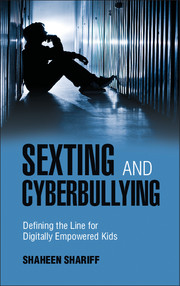Book contents
- Frontmatter
- Dedication
- Contents
- Preface
- Acknowledgments
- Chapter One Confronting Cyberbullying
- Chapter Two Sexism Defines the Lines between Fun and Power
- Chapter Three The Irony of Charging Children with Distribution of Child Pornography
- Chapter Four Keeping Kids Out of Court: Jokes, Defamation, and Duty to Protect
- Chapter Five From Lord of the Flies to Harry Potter: Freedom, Choices, and Guilt
- Appendix A Charting Out Canadian and U.S. Anti-Bullying Legislation (as it Applies or Can be Applied to Cyberbullying Incidents)
- Appendix B Expanded DTL Research Data
- Appendix C Sample Workshop Provided to Undergraduate Students at McGill University
- Appendix D Public Policy, Law, and Digital Media (Sample University-Level Course)
- Index
- References
Chapter Five - From Lord of the Flies to Harry Potter: Freedom, Choices, and Guilt
Published online by Cambridge University Press: 18 December 2014
- Frontmatter
- Dedication
- Contents
- Preface
- Acknowledgments
- Chapter One Confronting Cyberbullying
- Chapter Two Sexism Defines the Lines between Fun and Power
- Chapter Three The Irony of Charging Children with Distribution of Child Pornography
- Chapter Four Keeping Kids Out of Court: Jokes, Defamation, and Duty to Protect
- Chapter Five From Lord of the Flies to Harry Potter: Freedom, Choices, and Guilt
- Appendix A Charting Out Canadian and U.S. Anti-Bullying Legislation (as it Applies or Can be Applied to Cyberbullying Incidents)
- Appendix B Expanded DTL Research Data
- Appendix C Sample Workshop Provided to Undergraduate Students at McGill University
- Appendix D Public Policy, Law, and Digital Media (Sample University-Level Course)
- Index
- References
Summary
“Where’s the man with the megaphone? …” “Aren’t there any grownups at all?” “I don’t think so.” The fair boy said this solemnly, but then the delight of a realized ambition came over him.
(Golding, 1954, p. 7)“Harry, I owe you an explanation” said Dumbledore … “Youth cannot know how age thinks and feels. But old men are guilty if they forget what it was to be young …”
(Rowling, 2003, p. 728)“It is our choices, Harry, that show what we truly are, far more than our abilities.” – Professor Dumbledore
(Rowling, 1998, p. 245)Introduction
In this book, I have attempted to illustrate the generational rifts between adult perceptions of clear separations between the physical and virtual worlds and the fluid and integrated physical and virtual worlds of Digitally Empowered Kids (DE Kids) and Digitally Empowered Young Adults (DE Young Adults). As William Golding tried to show us many years ago, society’s rules, if too inflexible or irrelevant, can crumble in situations where children are free to break them. It’s all about how children and adults choose to apply the rules. This means appreciating that children will make thoughtless choices sometimes as they experiment with life and all that it has to offer. I quote the character of Professor Dumbledore from the Harry Potter books at the start of the chapter. He says: “…old men are guilty if they forget what it was to be young” (Rowling, 2003, p.728). In this regard, we are guilty if we choose to turn a blind eye to the conflicting tensions between young people’s vulnerability and agency as they grapple with adolescence into adulthood. We are guilty if we forget to have “fun” and engage with DE Kids to redirect some of their confusion. We are guilty if, instead, we make the choice to incarcerate them for their vulnerability, confusion, and imitation of the models adults provide them with.
As the DTL Research and discussion on moral development in Chapter 2 established, children and adolescents want to have fun. They can act impulsively despite being fully aware of the potential consequences. In doing so, they may not always make anticipated ethical choices, even if their particular stage of moral development equips them with the necessary alerts.
- Type
- Chapter
- Information
- Sexting and CyberbullyingDefining the Line for Digitally Empowered Kids, pp. 141 - 160Publisher: Cambridge University PressPrint publication year: 2014

